句子成分与结构
- 格式:ppt
- 大小:2.09 MB
- 文档页数:33
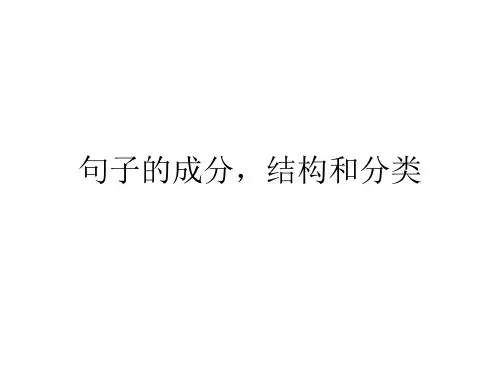
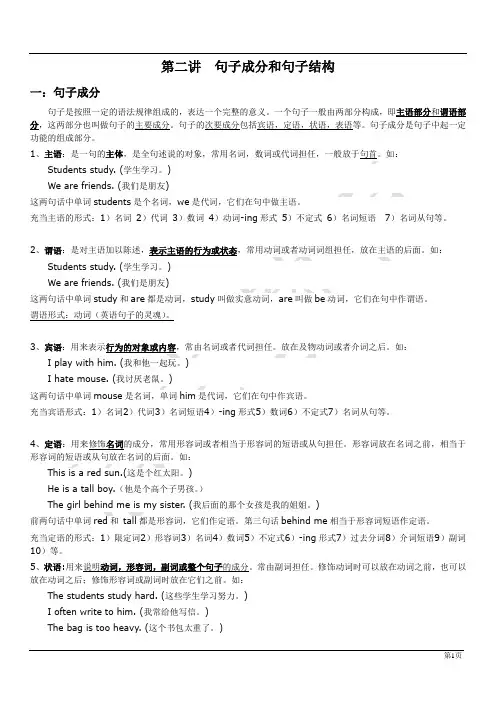
第二讲句子成分和句子结构一:句子成分句子是按照一定的语法规律组成的,表达一个完整的意义。
一个句子一般由两部分构成,即主语部分和谓语部分,这两部分也叫做句子的主要成分。
句子的次要成分包括宾语,定语,状语,表语等。
句子成分是句子中起一定功能的组成部分。
1、主语:是一句的主体,是全句述说的对象,常用名词,数词或代词担任,一般放于句首。
如:Students study. (学生学习。
)We are friends. (我们是朋友)这两句话中单词students是个名词,we是代词,它们在句中做主语。
充当主语的形式:1)名词2)代词3)数词4)动词-ing形式5)不定式6)名词短语7)名词从句等。
2、谓语:是对主语加以陈述,表示主语的行为或状态,常用动词或者动词词组担任,放在主语的后面。
如:Students study. (学生学习。
)We are friends. (我们是朋友)这两句话中单词study和are都是动词,study叫做实意动词,are叫做be动词,它们在句中作谓语。
谓语形式:动词(英语句子的灵魂)。
3、宾语:用来表示行为的对象或内容,常由名词或者代词担任。
放在及物动词或者介词之后。
如:I play with him. (我和他一起玩。
)I hate mouse. (我讨厌老鼠。
)这两句话中单词mouse是名词,单词him是代词,它们在句中作宾语。
充当宾语形式:1)名词2)代词3)名词短语4)-ing形式5)数词6)不定式7)名词从句等。
4、定语:用来修饰名词的成分,常用形容词或者相当于形容词的短语或从句担任。
形容词放在名词之前,相当于形容词的短语或从句放在名词的后面。
如:This is a red sun.(这是个红太阳。
)He is a tall boy.(他是个高个子男孩。
)The girl behind me is my sister. (我后面的那个女孩是我的姐姐。
)前两句话中单词red和tall都是形容词,它们作定语。
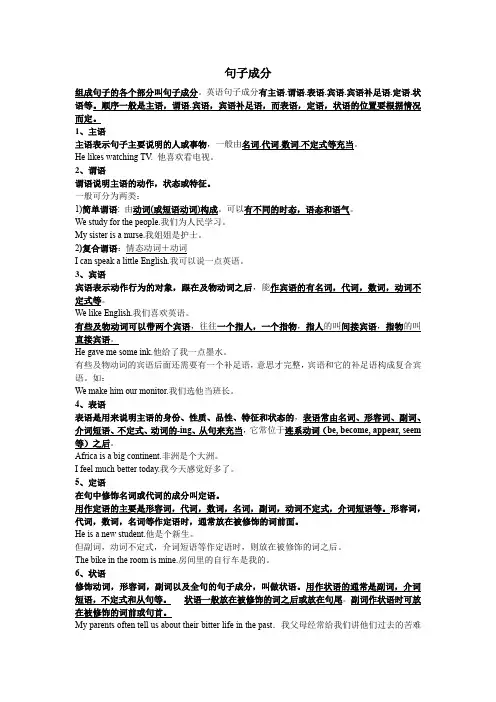
句子成分组成句子的各个部分叫句子成分。
英语句子成分有主语.谓语.表语.宾语.宾语补足语.定语.状语等。
顺序一般是主语,谓语.宾语,宾语补足语,而表语,定语,状语的位置要根据情况而定。
1、主语主语表示句子主要说明的人或事物,一般由名词.代词.数词.不定式等充当。
He likes watching TV. 他喜欢看电视。
2、谓语谓语说明主语的动作,状态或特征。
一般可分为两类:1)简单谓语: 由动词(或短语动词)构成。
可以有不同的时态,语态和语气。
We study for the people.我们为人民学习。
My sister is a nurse.我姐姐是护士。
2)复合谓语:情态动词+动词I can speak a little English.我可以说一点英语。
3、宾语宾语表示动作行为的对象,跟在及物动词之后,能作宾语的有名词,代词,数词,动词不定式等。
We like English.我们喜欢英语。
有些及物动词可以带两个宾语,往往一个指人,一个指物,指人的叫间接宾语,指物的叫直接宾语。
He gave me some ink.他给了我一点墨水。
有些及物动词的宾语后面还需要有一个补足语,意思才完整,宾语和它的补足语构成复合宾语。
如:We make him our monitor.我们选他当班长。
4、表语表语是用来说明主语的身份、性质、品性、特征和状态的,表语常由名词、形容词、副词、介词短语、不定式、动词的-ing、从句来充当,它常位于连系动词(be, become, appear, seem 等)之后。
Africa is a big continent.非洲是个大洲。
I feel much better today.我今天感觉好多了。
5、定语在句中修饰名词或代词的成分叫定语。
用作定语的主要是形容词,代词,数词,名词,副词,动词不定式,介词短语等。
形容词,代词,数词,名词等作定语时,通常放在被修饰的词前面。
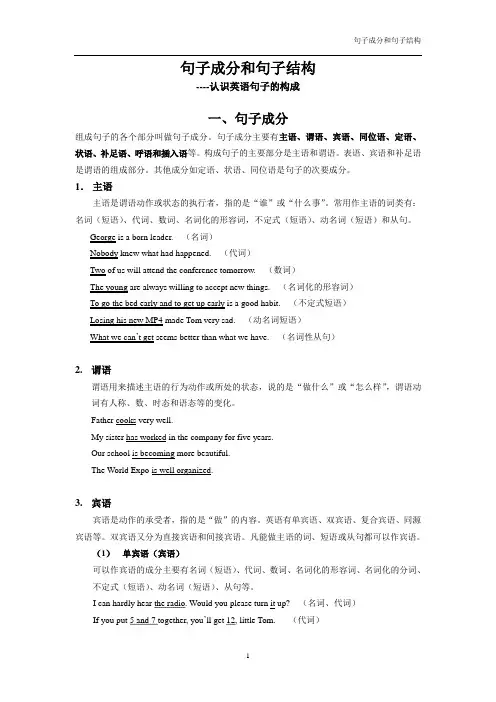
句子成分和句子结构----认识英语句子的构成一、句子成分组成句子的各个部分叫做句子成分。
句子成分主要有主语、谓语、宾语、同位语、定语、状语、补足语、呼语和插入语等。
构成句子的主要部分是主语和谓语。
表语、宾语和补足语是谓语的组成部分。
其他成分如定语、状语、同位语是句子的次要成分。
1.主语主语是谓语动作或状态的执行者,指的是“谁”或“什么事”。
常用作主语的词类有:名词(短语)、代词、数词、名词化的形容词,不定式(短语)、动名词(短语)和从句。
George is a born leader. (名词)Nobody knew what had happened. (代词)Two of us will attend the conference tomorrow. (数词)The young are always willing to accept new things. (名词化的形容词)To go the bed early and to get up early is a good habit. (不定式短语)Losing his new MP4 made Tom very sad. (动名词短语)What we can’t get seems better than what we have. (名词性从句)2.谓语谓语用来描述主语的行为动作或所处的状态,说的是“做什么”或“怎么样”,谓语动词有人称、数、时态和语态等的变化。
Father cooks very well.My sister has worked in the company for five years.Our school is becoming more beautiful.The World Expo is well organized.3.宾语宾语是动作的承受者,指的是“做”的内容。
英语有单宾语、双宾语、复合宾语、同源宾语等。
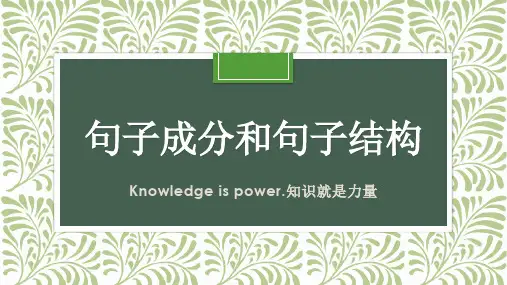
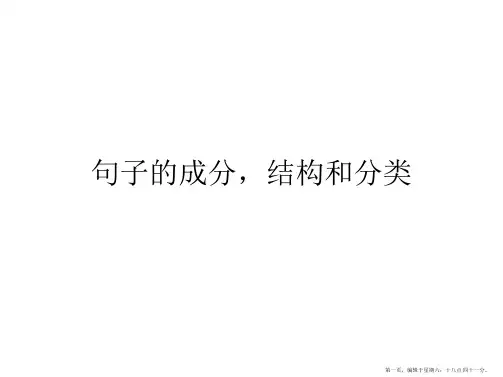
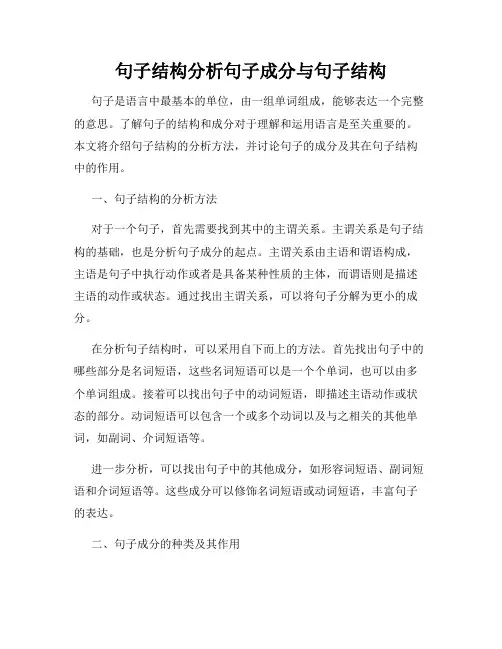
句子结构分析句子成分与句子结构句子是语言中最基本的单位,由一组单词组成,能够表达一个完整的意思。
了解句子的结构和成分对于理解和运用语言是至关重要的。
本文将介绍句子结构的分析方法,并讨论句子的成分及其在句子结构中的作用。
一、句子结构的分析方法对于一个句子,首先需要找到其中的主谓关系。
主谓关系是句子结构的基础,也是分析句子成分的起点。
主谓关系由主语和谓语构成,主语是句子中执行动作或者是具备某种性质的主体,而谓语则是描述主语的动作或状态。
通过找出主谓关系,可以将句子分解为更小的成分。
在分析句子结构时,可以采用自下而上的方法。
首先找出句子中的哪些部分是名词短语,这些名词短语可以是一个个单词,也可以由多个单词组成。
接着可以找出句子中的动词短语,即描述主语动作或状态的部分。
动词短语可以包含一个或多个动词以及与之相关的其他单词,如副词、介词短语等。
进一步分析,可以找出句子中的其他成分,如形容词短语、副词短语和介词短语等。
这些成分可以修饰名词短语或动词短语,丰富句子的表达。
二、句子成分的种类及其作用句子成分可以分为主要成分和次要成分。
主要成分是构成句子最核心的部分,次要成分则是对主要成分的补充和修饰。
1. 主语:主语是一个句子中最重要的成分之一,它一般位于谓语之前,指出句子中执行动作或具备性质的主体。
主语可以是一个名词、代词、名词短语或从句。
例句:(1) 他正在吃橙子。
(2) 书架上的书很多。
(3) 她是一位出色的歌手。
(4) 我希望他能来。
2. 谓语:谓语是句子中用来描述主语动作或状态的部分,是句子的核心成分。
谓语可以是一个动词、动词短语或从句。
例句:(1) 他在教讲一堂有趣的课程。
(2) 我们正在观看一部电影。
(3) 他说他不会来了。
3. 宾语:宾语是句子中接受动作的对象或受事者。
宾语可以是一个名词、代词、名词短语或从句。
例句:(1) 我买了一本新书。
(2) 他们正在讨论一个重要的问题。
4. 定语:定语是句子中修饰名词的成分,用来限定名词的属性或特征。
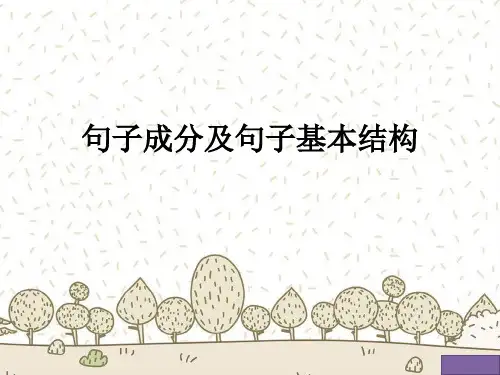
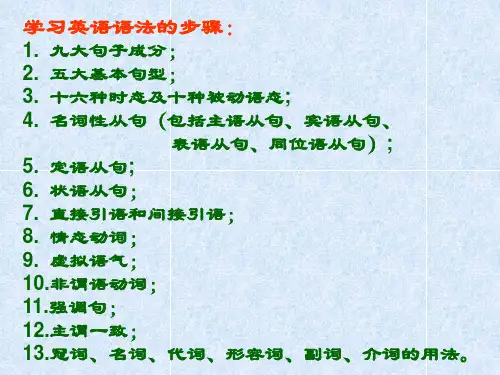
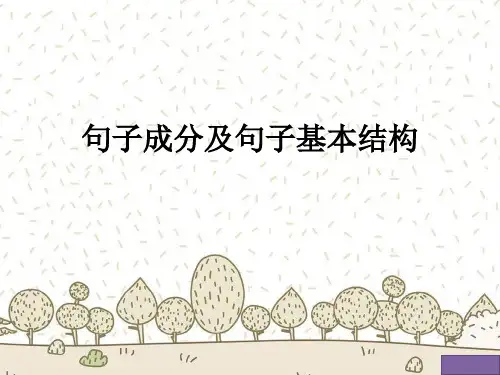
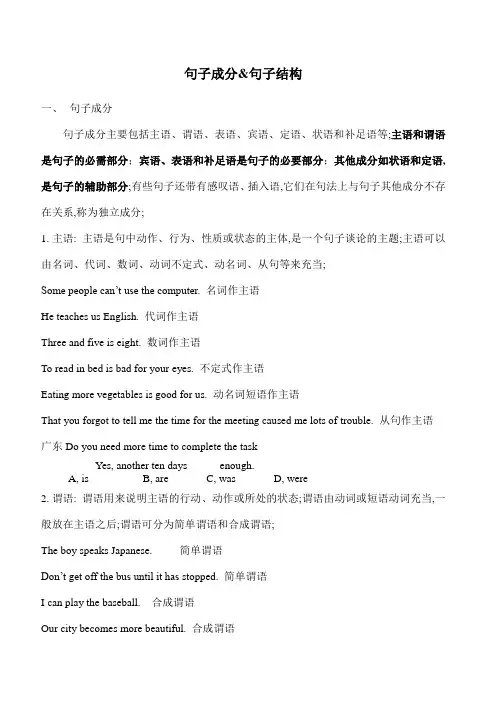
句子成分&句子结构一、句子成分句子成分主要包括主语、谓语、表语、宾语、定语、状语和补足语等;主语和谓语是句子的必需部分;宾语、表语和补足语是句子的必要部分;其他成分如状语和定语,是句子的辅助部分;有些句子还带有感叹语、插入语,它们在句法上与句子其他成分不存在关系,称为独立成分;1.主语: 主语是句中动作、行为、性质或状态的主体,是一个句子谈论的主题;主语可以由名词、代词、数词、动词不定式、动名词、从句等来充当;Some people can’t use the computer. 名词作主语He teaches us English. 代词作主语Three and five is eight. 数词作主语To read in bed is bad for your eyes. 不定式作主语Eating more vegetables is good for us. 动名词短语作主语That you forgot to tell me the time for the meeting caused me lots of trouble. 从句作主语广东Do you need more time to complete the taskYes, another ten days _____ enough.A, is B, are C, was D, were2.谓语: 谓语用来说明主语的行动、动作或所处的状态;谓语由动词或短语动词充当,一般放在主语之后;谓语可分为简单谓语和合成谓语;The boy speaks Japanese. 简单谓语Don’t get off the bus until it has stopped. 简单谓语I can play the baseball. 合成谓语Our city becomes more beautiful. 合成谓语3.宾语: 宾语表示动作、行为的对象,由名词、代词、数词、动名词、动词不定式或起名词作用的其他成分充当;I bought a book. 单宾语,名词The news surprised us. 单宾语,代词He told me the news about it. 双宾语,代词/名词A friend lent some money to me. 双宾语, 名词/代词We consider him an honest boy. 复合宾语Mr. Wang always makes his classes interesting. 复合宾语4.表语:表语用来说明主语的特征、属性、状态、身份等,与前面的连系动词一起构成系表结构作复合谓语;My pen friend is an American boy. 名词This book isn’t mine. 代词He was the first to come to school yesterday. 数词The man looks strong. 形容词My father is out. 副词His job is to clean the school. 动词不定式短语The dictionary is in the bag. 介词短语Wasting time is killing yourself. 动名词短语The trouble is that she has lost his phone number. 从句5.定语:定语是用来修饰名词或代词的句子成分,分为前置定语和后置定语两种; (1)前置定语:常用来充当前置定语的有形容词、代词、数词、名词或名词所有格,动词-ing 形式等;We had a good time in the park. adj.His father is doctor. pron.She cut the meat into two pieces. numeralThis is a stone table. n.Let’s put the child in the sleeping bag. v-ing(2)后置定语: 常用来充当后置定语的有形容词、副词、动词不定式、介词短语、分词短语和从句等;I have got something interesting to tell every one of you. Adj.The trees around were cut last week. Adv.Would do you like something to drink InfinitiveThe book on the bed is mine. Prepositional phraseThe model plane flying in the sky is made by Bill. Present participleThe woman who stands at the gate is my mother. Subordinate clause6.状语:状语常用来修饰动词、形容词、副词或整个句子;它可以表示时间、地点、程度、原因、目的、结果等;状语常由副词、介词短语、动词不定式、分词短语、从句等担当;They are walking in the park.He was looking everywhere for Jane.She was deeply moved by the story I told her.I’m sorry to keep you waiting for a long time.He spoke so fast that I couldn’t hear clearly what he said.7.补足语: 补足语是用来说明主语或宾语的性质、状态等的一种句子成分;含有宾语补足语的句子变为被动语态时,宾语补足语成了主语补足语;可以作为补足语的有名词、形容词、副词、介词短语、分词、动词不定式等;You must keep your bedroom clean.He was once again found wandering along the street.现在分词作主语补足语His parents made him stay at home. 动词不定式作宾语补足语→He was made to stay at home by his parents. 动词不定式作主语补足语8.同位语: 对句子中某一成分作进一步解释、说明,与其在语法上处于同等地位的句子成分即同位语;同位语常置于被说明的词之后;同位语由名词、代词、数词、从句等充当;This is Mr. Zhou, our headmaster.We each have a cellphone now.You may leave it to us two.We are excited about the news that we win the match.9.独立成分: 在句子中插入一个词或短语,这个词或短语并不和其他成分发生语法关系,此时这个词或短语就是一种独立成分;独立成分包括称呼语、感叹语、插入语等;Hurry up, friends, or we’ll be late. 称呼语作独立成分Aha I’ve got you right here. 感叹语作独立成分By the way, what do you usually do at weekend 插入语作独立成分二、句子结构英语句子按照结构可分为简单句、并列句和复合句;1.简单句:只有一个主语或并列主语和一个谓语或并列谓语的句子叫简单句;判断下列句子属于哪种简单句的基本句型:We walked and laughed.The children are playing.Children often sing this song.I don’t know what to do.My bike is new.He became a famous scientist.Mr. Wu teaches us English.My father bought me a new camera.We can hear someone playing the violin next door.We can keep it warm.拓展:There +be +主语+ 状语英语中有一个独特的句型叫there be 结构,该结构表示“某地/某时存在某人/某物”;There 无意义,be是谓语动词,它后面的名词是主语,两者在数上必须保持一致;句子最后为地点状语或时间状语;There is a car in front of the house.There are many books in his school bag.2.并列句: 并列句是由并列连词and, but, or, so等把两个或两个以上的简单句连在一起而构成的句子;并列连词的基本句子结构为:简单句+并列连词+ 简单句;(1)表示并列的并列连词I help her and she helps me.Both Wendy and Kate are from American.(2)表示选择的并列连词The girls can go with us, or they can stay at home.Either he or she is going to help us.(3)表示因果的并列连词The days are short, for it is now December.The boy did his homework carefully, so he never made any mistakes(4)表示转折的并列连词It is very good, yet it can be better.He is old but he is in good health.That region has plenty of natural resources while this one has none.3.复合句: 由一个主句和一个或一个以上的从句构成的句子叫做复合句;主句为句子的主体,从句不能独立,仅用作句子的一个成分,如主语、宾语、表语、同位语、定语、状语等;We shouldn’t give our children whatever they want.I’ll never forget the stories that my grandma told me.He worked for a foreign company when he was in Shanghai.一.划出下列句子中的主语①A mooncake is a delicious, round cake.②I don’t know if it will grow.③ Doing your homework in time is important.④To win the game is difficult.⑤There are some people in our classroom.⑥Five is not enough.二. 划出下列句子中的谓语①I saw a girl.②I love you.③ You should work English hard.④You had better take a bus.⑤I want to give you a book.三.划出下列句子中的宾语①I saw a cat in the tree.②We think you are right.③ My father bought me a book.④We call him LaoWang.⑤We forgot to close the window.四.划出下列句子中的定语①That is a beautiful flower.②This is my book, not your book.③ I have a lot of things to do.④I have met the boy in that room.⑤He has something important to say.五.划出下列句子中的状语①He is playing under the tree.②Ten years ago, She began to live in Dalian.③ The house is dirty because he didn’t clean it.④He buys a gift to make her happy.⑤If I am not busy tomorrow, I will play football with you.六. 划出下列句子中的表语①These desks are yellow.②It is getting cooler and cooler now.③ My work is teaching English,④It sounds good.⑤It smells nice.七. 划出句中的直接宾语和间接宾语① Please tell us a story.② My father bought a new bike for me last week.③ Mr. Li is going to teach us history next term.④ Here is a pen. Give it to Tom.⑤ Did he leave any message for me。
句子成分主要成分有主语和谓语;次要成分有表语、宾语、定语、状语、补足语、同位语和插入语。
主语:表示句子说的是什么人或什么事.是一个句子所叙述的主体,一般位于句首。
但在there be 结构、疑问句(当主语不疑问词时)和倒装句中,主语位于谓语、助动词或情态动词后面。
主语可由名词、代词、数词、不定式、动名词、名词化的形容词和主语从句等表示。
例如:1.During the 1990s, American country music hasbecome more and more popular. 名词2.We often speak English in class. 代词3.One-third of the students in this class are girls. 数词4.To swim in the river is a great pleasure. 不定式5.Smoking does harm to the health. 动名词6.The rich should help the poor. 名词化的形容词7.When we are going to have an English test hasnot been decided.主语从句8.It is necessary to master a foreignlanguage.it 作形式主语,真正的主语为后面的不定式谓语说明主语所做的动作或具有的特征和状态。
动词在句中作谓语,一般放在主语之后。
谓语的构成如下:1、简单谓语:由一个动词或动词短语构成。
如:He practices running every morning.2、复合谓语:(1)由情态动词加动词原形构成。
如:You may keep the book for two weeks.(2)由助动词加动词原形,现在分词,过去分词构成。
如:Do you speak English?They are working in a field.He has caught a bad cold.(3)由系动词加表语构成。
句子成分和句子结构
句子成分是指句子中的各个组成部分,包括主语、谓语、宾语、定语、状语等。
句子结构是指句子中各个成分之间的关系和组织方式,包括简单句、并列句、复合句等。
常见的句子成分有:
1.主语:句子中执行动作或被动地承受动作的名词或名词短语,提供
句子的主体。
例如:张三(主语)正在跑步。
2.谓语:表示主语动作或状态的动词或动词短语。
例如:张三正在(谓语)跑步。
3.宾语:接在及物动词后面,被动承受动作的名词或名词短语。
例如:张三正在跑步(谓语),锻炼身体(宾语)。
4.定语:修饰名词或代词的成分,修饰的内容可以是形容词、名词等。
例如:漂亮(定语)的花朵盛开了。
5.状语:修饰动词、形容词、副词或整个句子的成分,表示时间、地点、方式、原因等。
例如:昨天(状语)我去了图书馆。
常见的句子结构有:
1.简单句:由一个主语和一个谓语构成的句子,可以有宾语、定语、
状语等。
例如:我(主语)喜欢(谓语)跳舞。
2.并列句:由两个或多个分句通过并列关系连接在一起,各个分句地位相等。
例如:我喜欢唱歌,他喜欢跳舞。
3.复合句:由一个主句和一个或多个从句构成的句子,从句在句子中充当其他成分的一部分。
例如:我喜欢唱歌,因为它能让我放松身心。
一、句子成分句子成分的定义:构成句子的各个部分叫做句子成分。
包括:主语,谓语,表语、宾语、定语、状语、补足语和同位语。
(一)主语:主语是一个句子所叙述的主体,一般位于句首。
但在there be结构、疑问句(当主语不疑问词时)和倒装句中,主语位于谓语、助动词或情态动词后面。
主语可由名词、代词、数词、不定式、动名词、名词化的形容词和主语从句等表示。
例如:During the 1990s, American country music has become more and more popular.(名词)We often speak English in class.(代词)One-third of the students in this class are girls.(数词)To swim in the river is a great pleasure.(不定式)Smoking does harm to the health.(动名词)The rich should help the poor.(名词化的形容词)When we are going to have an English test has not been decided.(主语从句)It is necessary to master a foreign language.(it作形式主语,真正的主语为后面的不定式)(二)谓语:谓语说明主语所做的动作或具有的特征和状态。
动词在句中作谓语,一般放在主语之后。
谓语的构成如下:1、简单谓语:由一个动词或动词短语构成。
如:He practices running every morning.2、复合谓语:(1)由情态动词或其他助动词加动词原形构成。
如:Y ou may keep the book for two weeks. He has caught a bad cold.(2)由系动词加表语构成。
句子成分及句子结构一.句子成分主语(subject): 句子说明的人或事物。
The sun rises in the east. (名词)He likes dancing. (代词)Twenty years is a short time in history. (数词) Seeing is believing. (动名词)To see is to believe. (不定式)What he needs is a book. (主语从句)It is very clear that the elephant is round and tall like a tree. (It形式主语,主语从句是真正主语)谓语(predicate): 说明主语的动作、状态和特征。
We study English.表语(predicative): 系动词之后的成分,表示主语的性质、状态和特征。
He is a teacher. (名词)Seventy-four! You do n’t look it. (代词)Five and five is ten. (数词)He is asleep. (形容词)His father is in. (副词)The picture is on the wall. ( 介词短语)My watch is gone / missing / lost. (形容词化的分词)To wear a flower is to say “I’m poor, I can’t buy a ring. (不定式)The question is whether they will come. (表语从句)(常见的系动词有: be, sound(听起来), look(看起来), feel (摸起来),smell(闻起来), taste (尝、吃起来), remain(保持,仍是), feel(感觉)It sounds a good idea. The sound sounds strange.Her voice sounds sweet. Tom looks thin.The food smells delicious. The food tastes good.The door remains open. Now I feel tired.宾语:1)动作的承受者-----动宾I like China. (名词)He hates you. (代词)How many do you need? We need two. (数词)We should help the old and the poor. I enjoy working with you. (动名词)I hope to see you again. (不定式)Did you write down what he said? (宾语从句)2)介词后的名词、代词和动名词-----介宾Are you afraid of the snake? Under the snow, there are many rocks.3)双宾语-----间宾(指人)和直宾(指物)He gave me a book yesterday. Give the poor man some money.宾补:对宾语的补充,全称为宾语补足语。